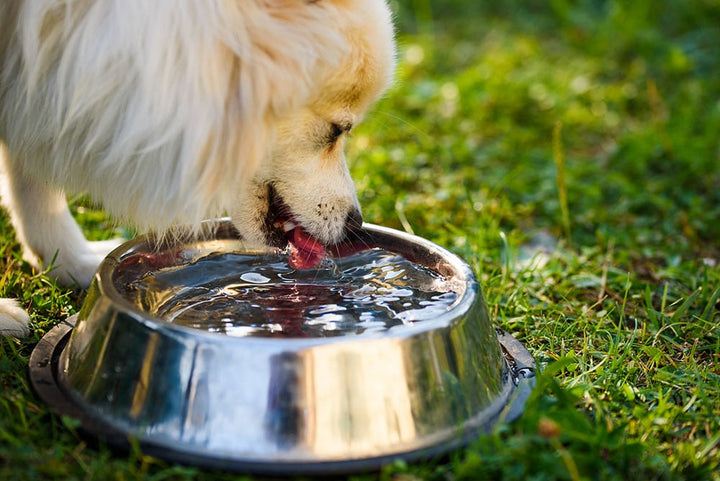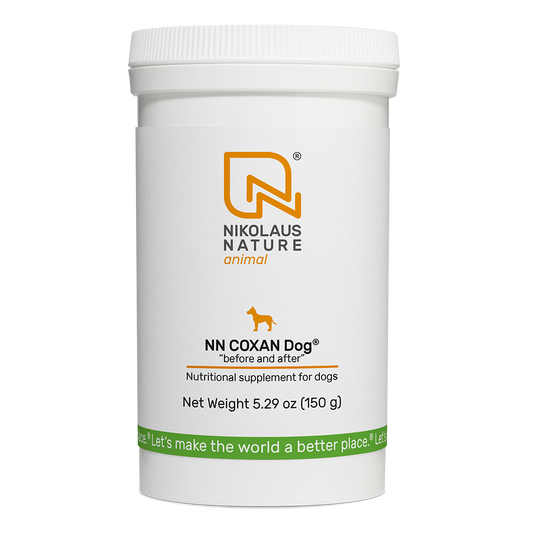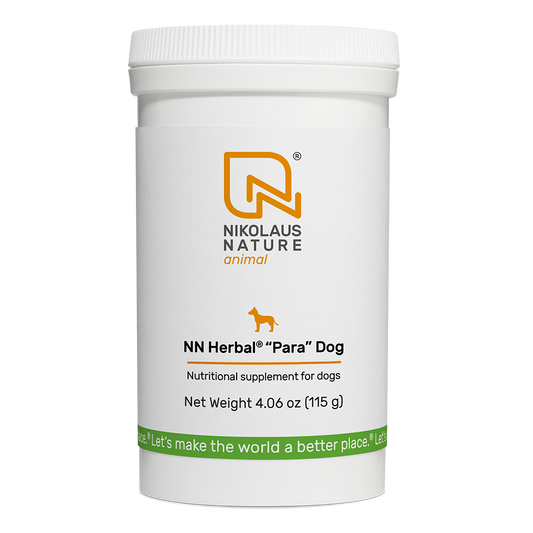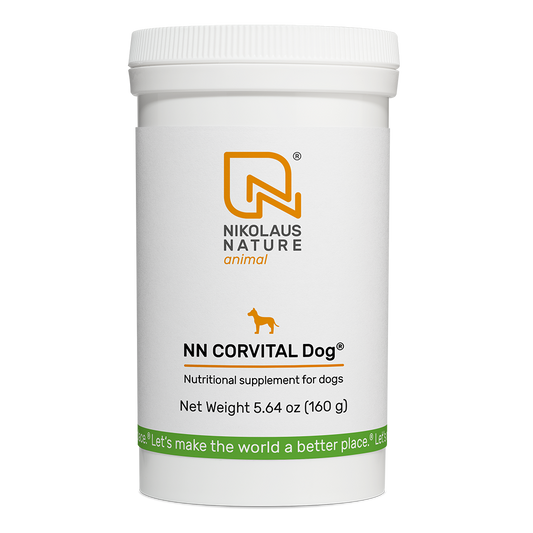The Importance of Hydration for Your Dog's Heart Health
Water is not the first thing that comes to mind when you think about keeping your dog healthy. However, staying hydrated is essential—especially for your dog’s heart!
Did you know that water makes up about 60% of your dog’s body weight? Just like humans, dogs need enough water to keep their organs, including the heart, working properly.
But hydration isn’t just about refilling their water bowl. You need to know how much water your dog needs and make sure they’re drinking enough every day.
Want to know how to keep your dog happy, healthy, and hydrated? Keep reading for easy tips and advice to protect your dog’s heart and improve their life!

Why Hydration is Essential for Your Dog's Heart Health
Water keeps your dog’s body running smoothly, like oil in a machine. Without it, their heart has to work hard which can cause serious issues.
Here's why keeping your dog hydrated is so important for their heart health:
Supports Blood Circulation
Water is the primary component of blood. It is essential for efficient circulation. Adequate water helps the blood to flow smoothly through the vessels, delivering oxygen and nutrients to tissues and organs.
Poor hydration can lead to thicker blood, making it harder for the heart to pump, which could strain this vital organ.
This is especially important for small breed dogs, who are already prone to thickening of the heart valves (mitral valve disease).
Prevents Overwork of Your Dog’s Heart
When a dog is dehydrated, the heart has to work harder to pump blood and maintain adequate circulation.
This added strain increases the risk of cardiovascular complications, especially in older dogs or those with pre-existing heart conditions.
Providing enough water helps the heart maintain its workload without unnecessary stress.
Hydration Helps to Maintain Normal Blood Pressure
Proper hydration plays a critical role in maintaining normal blood pressure. Water helps balance the amount of salt in the bloodstream, which in turn influences vascular resistance and blood pressure.
Dehydration can lead to low blood volume, causing drops in blood pressure and making your dog lethargic or dizzy.
This can be particularly dangerous for dogs with kidney disease, as they are already at risk for blood pressure fluctuations.
Helps to Regulate Dog’s Body Temperature
Dogs rely on water to regulate their body temperature, especially during warm weather or physical activity. When dehydrated, dogs are at a higher risk of overheating, which places additional strain on the heart.
Hydration allows them to dissipate heat more effectively through panting and other natural mechanisms.
Remember that brachycephalic breeds (like Bulldogs and Pugs) are more susceptible to heatstroke, so keeping them hydrated is very important.
Aids in Electrolyte Balance
Electrolytes, such as potassium and sodium, are essential for proper heart function. These minerals help regulate the heartbeat and ensure muscle contractions occur smoothly.
Adequate hydration maintains the balance of electrolytes in your dog’s body, supporting optimal cardiovascular health.
Vomiting and diarrhea can quickly deplete electrolytes, so it's important to encourage your dog to drink water or offer electrolyte-rich fluids if they experience these issues.
In a study published in the Journal of Veterinary Internal Medicine, researchers found that electrolyte disturbances, particularly low sodium and chloride levels, were associated with increased mortality rates in dogs with heart disease.
Reduces Risk of Kidney Strain in Dogs
Dehydration can lead to kidney strain, which indirectly affects heart health. When the kidneys struggle to filter waste efficiently, toxins can accumulate in the bloodstream, increasing the workload on the heart.
Hydration supports kidney function, reducing this burden and promoting overall health. Chronic kidney disease is a common problem in senior dogs, and dehydration can significantly worsen their condition.
Supports Cellular Function
Every cell in your dog’s body relies on water to function properly. For heart cells, in particular, hydration is essential for energy production and electrical activity, which regulates the heartbeat.
Dehydrated cells may struggle to perform, leading to irregularities in heart function. This is why dehydration can sometimes cause an abnormal heart rhythm (arrhythmia).
Boosts Circulation and Oxygenation
Proper hydration improves circulation and ensures that oxygen is delivered to tissues effectively. Oxygenation is vital for every organ, especially the heart, which requires a steady supply of oxygen to pump efficiently.
Dehydration limits this process, increasing the risk of fatigue and cardiovascular stress. Adequate oxygen delivery is important for athletic dogs or working breeds who engage in strenuous activities.
Helps Prevent Dehydration-Induced Collapse
Severe dehydration can lead to a life-threatening collapse due to circulatory shock. This occurs when blood volume becomes too low to maintain adequate pressure and supply.
According to a study, dehydrated dogs exhibit lower carotid blood flow and cardiac output during exercise, which can significantly impact their cardiovascular performance.
Ensuring your dog stays hydrated reduces the risk of such emergencies, providing peace of mind for pet owners.
If you notice signs of severe dehydration like sunken eyes, dry gums, loss of skin elasticity, or lethargy, see your veterinarian immediately.
Supports Healthy Digestion and Nutrient Absorption
Hydration is critical for digestion, which indirectly impacts heart health. Water aids in breaking down food and absorbing nutrients, including those essential for cardiovascular function, such as magnesium and omega-3 fatty acids.
A hydrated dog is more likely to extract the full nutritional benefit from their diet. A balanced diet with high-quality protein sources and essential fatty acids, along with proper hydration, can contribute to a healthy heart.

Signs of Dehydration Affecting Dog's Heart Health
Here are some key indicators to watch out for:
- Increased Heart Rate (Tachycardia) – The heart beats faster when the body is dehydrated, trying to compensate for thickened blood that moves more slowly.
- Weak Pulse – A weak or thready pulse can indicate reduced blood volume due to dehydration, making it harder for the heart to pump effectively.
- Dry or Sticky Gums – Dry or tacky gums are a visible sign of dehydration, showing that your dog’s body lacks enough fluids to keep mucous membranes healthy.
- Lethargy and Weakness – When dehydrated, your dog may feel sluggish and tired because their body isn’t able to circulate blood and oxygen properly.
- Sunken Eyes – Eyes that appear sunken or hollow are often a sign of severe dehydration, as the lack of fluids causes tissues around the eyes to shrink.
- Vomiting or Diarrhea – Vomiting or diarrhea can quickly lead to dehydration, which in turn affects the heart and other vital functions.
- Fainting or Collapse – Severe dehydration can cause the heart to fail to pump blood effectively, resulting in a drop in blood pressure that can lead to fainting or collapse.
- Panting or Rapid Breathing – The body may attempt to compensate for dehydration by increasing respiratory rate.
- Loss of Skin Elasticity – When you gently pinch your dog’s skin, it may not snap back quickly if they’re dehydrated.
- Dark or Reduced Urine Output – Concentrated or minimal urine indicates insufficient fluid levels.
Hydration Solutions for Dogs
There are several solutions that can help make sure your dog is getting enough fluids throughout the day. Not all dogs will drink enough water from their bowl on their own, especially if they’re picky or feeling unwell.
That’s where hydration drinks and hydrating food can play a key role in ensuring your dog’s health.
Hydration Drinks for Dogs
There are specially formulated hydration drinks made just for dogs that can help maintain their fluid levels, especially if they’re sick, recovering from surgery, or simply not drinking enough.
These drinks often contain electrolytes, which help restore the balance of fluids and prevent dehydration. Some even include added nutrients like vitamins to support your dog’s overall health.
You can find these hydration solutions at pet stores or online, and they come in different flavors that appeal to your dog’s taste buds.
Make sure to choose a drink that’s specifically designed for pets, as human drinks (like Gatorade) may contain ingredients that aren’t safe for dogs, such as excess sugar or artificial sweeteners.
For example, xylitol is a common artificial sweetener in human products that is toxic to dogs.
These hydration drinks are best used when your dog isn’t drinking enough water, especially during hot weather or after exercise.
Hydrating Dog Food
Another fantastic option for hydration is incorporating wet dog food into your dog’s diet. Wet food contains a higher percentage of water compared to dry kibble, making it an easy way to increase fluid intake.
Some hydrating dog food options are specifically designed to support hydration while offering balanced nutrition, which is perfect for dogs that need more fluids but don’t want to drink too much water on their own.
Not only does wet food help with hydration, but it also aids in digestion, as it’s often more palatable and easier to digest for dogs, especially older dogs or those with sensitive stomachs.
If your dog isn’t a fan of drinking water, a diet that includes wet food can significantly help maintain their hydration levels.
For example, many senior dogs experience a decline in their sense of thirst, making them prone to dehydration. Wet food can be a valuable tool in combating this issue.
Additionally, if you’re looking for even more hydration support, there are also freeze-dried or dehydrated foods that can be rehydrated with water, providing both nutrition and fluid.
Combining wet food with added hydration solutions like broths or homemade liquid treats can ensure your dog stays hydrated without them even realizing it!
Best Alternate Ways to Hydrate a Dog
Sometimes, a dog just won’t drink enough water from a bowl, and as a pet parent, it's important to have other ways to help hydrate them. Whether they’re sick, recovering from surgery, or simply not thirsty enough, there are several creative methods to boost hydration.
Here are some effective alternatives that can help keep your dog hydrated and healthy.
Hydration-Boosting Ice Cubes
Ice cubes are a fun, simple, and effective way to help hydrate your dog. Not only are they a cool treat on hot days, but ice cubes also encourage dogs to lick and chew, which can increase fluid intake.
You can freeze water or broth (low-sodium, no onions) into cubes for added flavor, making it even more enticing. For dogs who don’t drink enough water or have digestive issues, frozen ice cubes can be an easy way to help maintain hydration.
You can also make ice cubes with added ingredients like pureed fruits or vegetables (just be sure they’re safe for dogs—fruits like blueberries or watermelon, or vegetables like cucumber or carrots ).
Important Note: Some dogs, especially those with sensitive teeth or a tendency to gulp, might do better with crushed ice instead of whole cubes. This can prevent potential tooth damage or choking hazards.
Syringe or Dropper Feeding
If your dog refuses to drink on their own, using a syringe or dropper can be a great solution. Simply fill the syringe or dropper with water (or a hydration solution like electrolyte water designed for dogs) and gently squirt small amounts into your dog’s mouth.
It’s an effective method, especially for puppies, small dogs, or those recovering from surgery or illness. Be gentle, and never force it—allowing your dog to swallow at their own pace will make the process more comfortable and less stressful.
Just be sure to use clean syringes and only give small amounts at a time to avoid choking.

Wet Towels or Cooling Mats
When the weather is hot or your dog is experiencing heat stress, using wet towels or cooling mats can help them stay hydrated and cool down quickly.
You can wet a towel with cold water and drape it over your dog, especially around the neck or under the belly. This method helps them absorb moisture through their skin, providing extra hydration.
Cooling mats, designed with gel or water-filled pockets, are another great alternative that can keep your dog comfortable in warm conditions while promoting hydration. These solutions are especially useful for older dogs or dogs with respiratory issues who may have a harder time keeping cool in the heat.
Spritzing with Water
If your dog is resistant to drinking water, a simple spritz of water on their face or back can be a fun and refreshing way to get some fluid into their system.
You can use a spray bottle to lightly mist your dog’s fur, or even directly spray their paws, which is a spot many dogs enjoy being touched. Not only will this help with hydration, but it’s also soothing and cooling for them, especially during hot weather or after exercise.
Just be careful not to overdo it—keep the spritze light and avoid spraying their face directly, particularly their eyes or nose.
For added appeal, consider using a spray bottle filled with a diluted dog-safe herbal tea, like chamomile or peppermint. These can provide a calming and refreshing aroma.
Additional Tips for Keeping Your Dog Hydrated
- Provide multiple water sources throughout your home and yard. This will make it easier for your dog to find water when they're thirsty.
- Some dogs may prefer to drink from a water fountain. The sound and movement of running water can be more enticing to some dogs than a stagnant bowl.
- Keep your dog's water bowl clean and fresh. Change the water frequently and wash the bowl regularly.
- Encourage your dog to drink water by playing games with them or taking them for walks.
- Monitor your dog's urine output. If you notice that your dog is urinating less frequently or that their urine is dark yellow or strong-smelling, they may be dehydrated.
- Talk to your veterinarian if you have any concerns about your dog's hydration. They can help you determine if your dog is getting enough fluids and recommend ways to improve their hydration.
Conclusion
Taking care of your dog’s hydration is one of the most important things you can do for their heart health. Remember, hydration supports so much more than just thirst—it helps with blood circulation, maintaining a healthy body temperature, electrolyte balance, and even aids digestion. If your dog is dehydrated, it could lead to more serious issues like heart strain or even collapse, and we definitely don’t want that.
So, the next time you see your dog not drinking enough water, try out some of the solutions we discussed—hydration drinks, wet food, ice cubes, or even a syringe if they’re really not feeling it. These little things can go a long way in keeping your dog happy, healthy, and full of energy.
Ask yourself—how often do you check if your dog is properly hydrated? Could something as simple as a few extra ounces of water a day really make a difference? I’m telling you, it will. Your dog’s heart will thank you for it.
FAQs
Can dehydration lead to heart failure in Dogs?
Yes, dehydration can put extra strain on your dog’s heart, potentially leading to heart failure, especially if it affects the blood flow and electrolyte balance. It's essential to keep your dog hydrated to avoid this risk.
How can I keep my dog hydrated when they're sick?
When your dog is sick, try offering water in small, frequent amounts, using a syringe or dropper if necessary. You can also offer hydrating foods like wet dog food or homemade broths to help them stay hydrated.
Can I use supplements for my Dog’s heart health?
Yes, supplements like NN CORVITAL, taurine, and coenzyme Q10 can help support heart health in dogs. Always consult your veterinarian before introducing new supplements to your dog’s diet.
How much water should a dog drink in 24 hours?
On average, a dog should drink about 1 ounce of water per pound of body weight daily. For example, a 10-pound dog should drink roughly 10 ounces of water a day, though this can vary based on activity level, diet, and health.
Is salt water good for dog skin?
Saltwater can have some healing properties for minor skin irritations, but it should be used cautiously. Excessive salt can be harmful if ingested, so make sure the saltwater is properly diluted and rinse it off afterward. For more serious skin issues, consult a vet.
Sources:
- Total Water in Dog’s Body, https://www.sciencedirect.com/topics/veterinary-science-and-veterinary-medicine/body-water
- Mitral valve disease in dogs, https://www.pdsa.org.uk/pet-help-and-advice/pet-health-hub/conditions/mitral-valve-disease-in-dogs#
- Brachycephalic Dog Breeds, https://www.hsvma.org/brachycephalic
- Clinical relevance of serum electrolytes in dogs and cats with acute heart failure: https://pmc.ncbi.nlm.nih.gov/articles/PMC8295692/
- Arrhythmias (Abnormal Rhythms) in Dogs, https://www.vet.cornell.edu/hospitals/services/cardiology/arrhythmias-abnormal-rhythms-dogs
- Breed groups: https://www.pdsa.org.uk/pet-help-and-advice/looking-after-your-pet/puppies-dogs/dog-breed-groups
- Dehydration reduces stroke volume and cardiac output, https://pmc.ncbi.nlm.nih.gov/articles/PMC7294577/
- Paws Off Xylitol; It's Dangerous for Dogs, https://www.fda.gov/consumers/consumer-updates/paws-xylitol-its-dangerous-dogs
- Ice cubes for dogs, https://www.bluecross.org.uk/advice/dog/ice-cubes-for-dogs#







